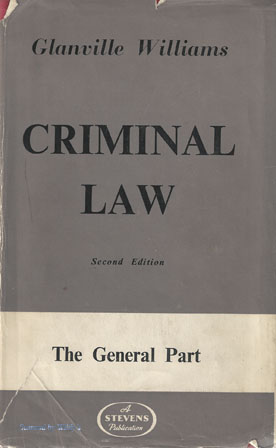
Out Of Print
This is a book which examines the general legal principles which apply to crimes. By it Dr. Glanville Williams has enhanced a world-wide reputation for clear thinking and exact writing. As the Cambridge Journal put it.
[This book] is the most comprehensive theoretical and practical major work on the general part of the criminal law available in the common law countries and an outstandingly valuable practical contribution to the understanding and administration of the existing law."
In the eight years since the first edition was published there have been important deyelopments in the criminal law and in this edition there are 200 pages more than in its predecessor and it contains some 550 additional cases.
Statutory changes had to be dealt with and in particular the Mental Health Act, 1959, called for a rewriting of much of the chapter on Mental Disorder. The notable additions to the literature on the subject have been noted and incorporated. Where the law is uncertain or obscure Dr. Williams has called in aid valuable decisions from overseas.
from the Preface
This book is concerned to search out the general rules of the criminal law, i.e., those applying to more than one crime. The great proliferation of criminal offences by the legislature means that many crimes are not fully covered by judicial interpretation; but all are governed by certain general principles, which are conveniently described on the Continent as the “general part” of the law.
By bringing together the authorities on such concepts as knowledge, intent to defraud, and claim of right, the root principles are thrown into relief, and the attention of the practitioner is directed to relevant authorities that may be decided under different statutes from the one with which he is immediately concerned.
The extent of revision needed for this edition may be judged from the fact that it contains 200 pages more than its predecessor, with some 550 additional cases. In particular, the new Mental Health Act called for a rewriting of much of the chapter on Mental Disorder. There were notable additions to the literature to be recorded and utilised; and the American Law Institute’s Model Penal Code proved a valuable ally in the argument for more rational principles of the criminal law.
The preparation of this edition was part of the work I was able to do as first Walter E. Meyer Visiting Research Professor at the New York University School of Law. I should like to express my warm appreciation to the trustees of the Walter E. Meyer Research Institute and to the Dean and Faculty of the Law School f or many kindnesses and for making it possible for me to work among the rich resources of an American law library.
G.L.W. Jesus College, Cambridge. July 8, 1961